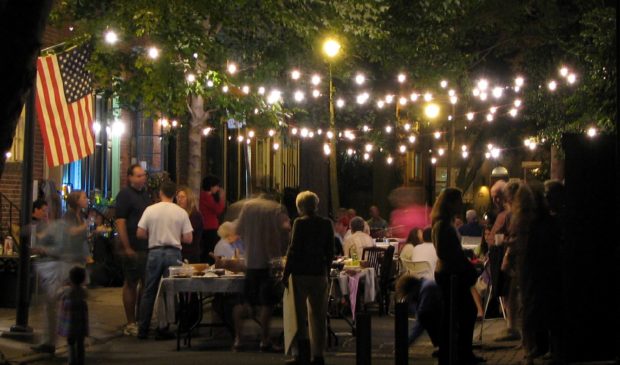Activists push for friendlier block party rules, as special events task force trudges on
Tuesday, January 7, 2020 by
Chad Swiatecki A member of the city’s Pedestrian Advisory Committee is beginning a campaign to push the city to relax its rules and regulations for organizing block parties, which came under a new permitting process last year.
Adam Greenfield, the committee member who also leads the Streets for All open space activism group, has gathered more than 200 online signatures through his website that lays out many criticisms of Austin’s rules covering small neighborhood block parties. Greenfield said his two-plus years of research of block party rules in 65 major U.S. cities found Austin has a higher application fee, at $50, than many other cities; allows the shortest duration for the parties at four hours total; and has one of the earliest curfews, 10 p.m.
Also of concern is the city’s prohibition of block parties on streets containing homes with more than three units on a lot.
The group held a block party in East Austin in early December to draw attention to its effort, with plans to soon seek support from City Council members and lobby them for specific action to lessen the regulations.
“The basic fact is the city, through its rules, doesn’t trust its residents to do the right thing. It creates all these rules and regulations that make it harder for people to have block parties,” he said. “They do that through burdensome regulations and it just puts people off from having the events in the first place.”
Greenfield said the recent changes in permitting for block parties have given too much authority to the Austin Center for Events and related departments.
“There is not an appetite for changing things. What I’ve seen with the block party regulations is a thoroughness and heavy-handedness that is appropriate for a larger event with lots of variables in play, and they’re applying the same rigorousness to small events which don’t require them.”
The impact of block parties on city services and the surrounding community is a small component of the city’s long-in-coming Special Events Ordinance, which was under consideration and review for six years before it finally took effect last year.
Following the implementation of the ordinance last spring, the city formed a Special Events Task Force to study a tiered approach to setting rules for the ordinance, with the permitting process and application fees for an event varying based on its overall impact. Late last year, the task force asked for an additional six months to deliver its recommendations to Council along with separate recommendations from city staff, with an end date now anticipated for the end of September.
Frances Hargrove, a special events manager for the city, said the pilot program covering block party permitting that began last year has provided some lessons for how the rules could be changed, but safety concerns and traffic patterns will make it difficult to authorize parties for areas with dense housing.
“Even though we’ve gotten some requests, I don’t know that would fit into a neighborhood block party,” she said. “I would think that would be more of an under a special event ordinance type of situation because you’re talking about more people, more vehicles, and from a safety standpoint we’d want more precautions in place.”
Hargrove said the task force is likely to relax some rules for portions of the ordinance that aren’t as big of a concern as they were when it was first drawn up in 2013. Still, considerations around public safety will remain the city’s primary concern as the rules are finalized and implemented.
“What was really important six years ago isn’t as big of a deal now, and the task force and staff recognize there needs to be some updates to make the ordinance make more sense and be a little more palatable to people,” she said. “We’re still piloting this and trying to come up with practices to address some of the concerns … but we’re a regulatory entity and have to be concerned about public safety, and sometimes that collides with people who just want to have a good time.”
Photo by Kyle Gradinger made available through a Creative Commons license.
The Austin Monitor’s work is made possible by donations from the community. Though our reporting covers donors from time to time, we are careful to keep business and editorial efforts separate while maintaining transparency. A complete list of donors is available here, and our code of ethics is explained here.
You're a community leader
And we’re honored you look to us for serious, in-depth news. You know a strong community needs local and dedicated watchdog reporting. We’re here for you and that won’t change. Now will you take the powerful next step and support our nonprofit news organization?







